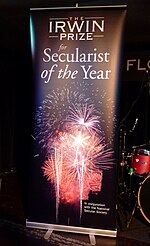National Secular Society
[3] In 1877 Bradlaugh and Annie Besant were prosecuted for publishing a book containing birth control information, The Fruits of Philosophy by the American doctor Charles Knowlton.
Foote's successor was Chapman Cohen (president from 1915 to 1949), a prolific pamphleteer and author of books on religion and philosophy for a popular audience.
Notable presidents in the second half of the twentieth century were David Tribe and Barbara Smoker, who did much to increase the use of the media to put across secularist views.
The Society argues that children of families of no-faith and "the wrong faith" are being increasingly discriminated against in admission procedures, because of the high number of religious schools.
The NSS has drawn attention to recent statistical research supporting its claims of discrimination in faith schools, based on selection of pupils from wealthier families.
In 2010, the NSS instigated a judicial review to test the legality of prayers being part of the official business of Council meetings, as it believes politics and religion should be kept separate.
[10] Further campaigns are concerned with the conscientious objections by doctors and pharmacists to refuse to administer certain procedures or treatments; the religious exemption from laws requiring stunning of animals before slaughter[11] and for the labelling of meat produced without stunning (much of it is currently sold to the general public unlabelled, both in shops and in restaurants); and the reform of the Scouts movement to remove references to God from their promise.
For example, it has written about faith-based welfare; doctors' conscientious objections; the prosecution of racist and religious crimes; the census; organ donation; and equality issues.
At a Council of Europe conference in San Marino, its interventions caused the closing communiqué to be changed to require consultation on inter-cultural matters, giving much more emphasis to civil society, as opposed to religious bodies.
The NSS started assisting Roy Brown on the UN Human Rights Council in Geneva, and continues on a broader front, raising awareness of its problems with a growing list of international bodies.
In the European Parliament (EP), the NSS is involved with the Separation of Religion & Politics Working Group, and attended the launch of the Brussels Declaration.
[14] Mr Justice Ouseley declared that the fact that atheists might feel uncomfortable during prayers was not a reason for them to be granted the protection of the state under human rights law, which had been the argument of the NSS's counsel.
'[16] In light of the ruling, the law was brought into force ahead of schedule in February 2012, and its general power of competence was asserted to have restored the ability of councils to hold prayers as part of the meeting should the majority of them wish to do so.
Observances) Act 2015 was granted Royal Assent, explicitly restoring the right of councils to hold prayers as a formal part of meetings should they wish.
In 2011, the NSS announced its intention to take forward a legal challenge against Woking Borough Council, which allowed those attending services in churches close to the town centre to claim a refund of their parking charges.
Previous prize winners include former Liberal Democrat Member of Parliament (MP) Evan Harris, Lord Avebury, Sophie in 't Veld MEP and Peter Tatchell.

